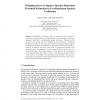Free Online Productivity Tools
i2Speak
i2Symbol
i2OCR
iTex2Img
iWeb2Print
iWeb2Shot
i2Type
iPdf2Split
iPdf2Merge
i2Bopomofo
i2Arabic
i2Style
i2Image
i2PDF
iLatex2Rtf
Sci2ools
121
click to vote
NOLISP
2005
Springer
2005
Springer
Weighting Scores to Improve Speaker-Dependent Threshold Estimation in Text-Dependent Speaker Verification
The difficulty of obtaining data from impostors and the scarcity of data are two factors that have a large influence in the estimation of speakerdependent thresholds in text-dependent speaker verification. Furthermore, the inclusion of low quality utterances (background noises, distortion...) makes the process even harder. In such cases, the comparison of these utterances against the model can generate non-representative scores that deteriorate the correct estimations of statistical data from client scores. To mitigate the problem, some methods propose the suppresion of those scores which are far from the estimated scores mean. The tecnique results in a ‘hard decision’ that can produce errors especially when the number of scores is low. We propose here to take a ‘softer decision’ and weight scores according to their distance to the estimated scores mean. The Polycost and the BioTech databases have been used to show the effectiveness of the proposed method.
Client Scores | Low Quality Utterances | NOLISP 2005 | Signal Processing | Text-dependent Speaker Verification |
| Added | 28 Jun 2010 |
| Updated | 28 Jun 2010 |
| Type | Conference |
| Year | 2005 |
| Where | NOLISP |
| Authors | Javier R. Saeta, Javier Hernando |
Comments (0)

